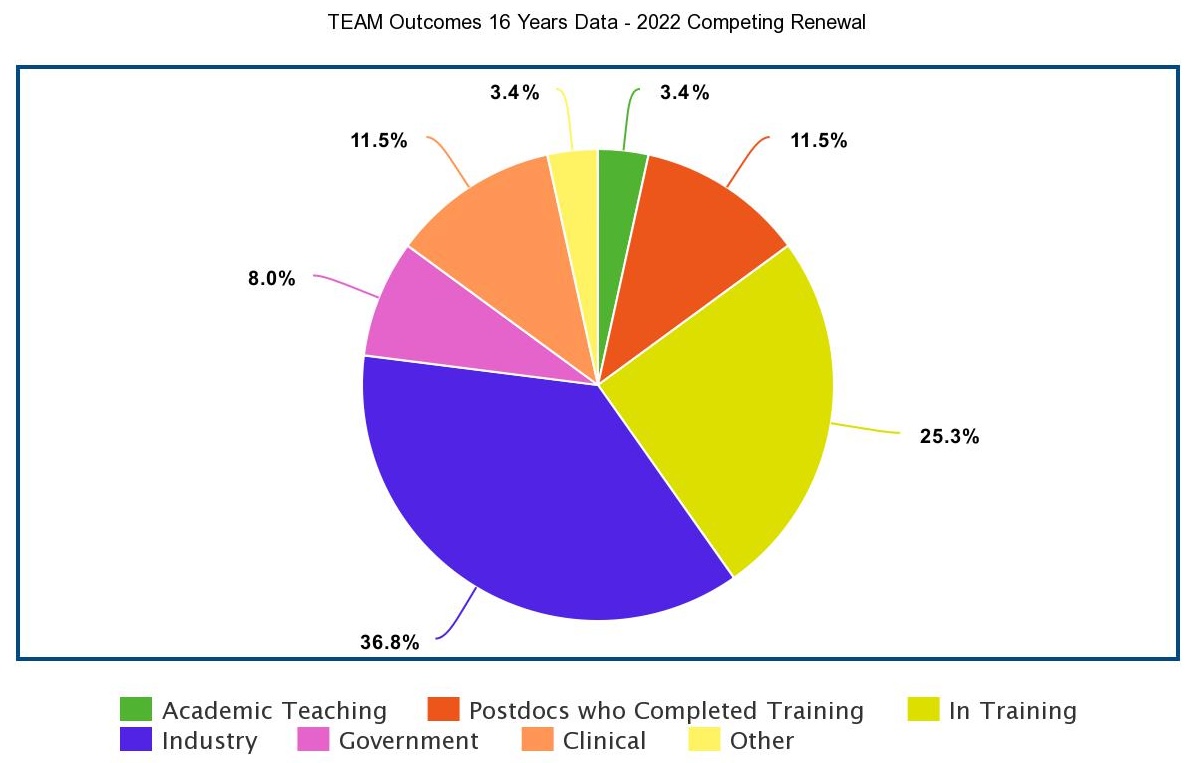Tissue Engineering and Regeneration (TEAM) is an interdisciplinary research-intensive training program for individuals who wish to pursue careers in the oral sciences with a focus on the restoration of oral-craniofacial tissues.
Researchers and clinicians from the School of Dentistry, the Medical School, and the College of Engineering at the University of Michigan serve as participants and mentors in this program. The National Institute of Dental and Craniofacial Research (NIDCR) has invested over $5 million in TEAM. This means excellent training and financial support for you. Our goal is to provide the necessary background course work, research training, and intellectual interplay with the various academic disciplines that intersect in the biomaterials field to provide training for the next generation of leaders in this area, with a focus in oral-craniofacial related biomaterials/bioengineering.
PROGRAM AND APPLICATION INFORMATION
Application Process
Applicants are nominated by their research mentors. Mentors and applicants are strongly encouraged to work on the required application materials together.
2025 TEAM (T32) Nominations are currently open. Please review the following files for more details.
Predoctoral & Postdoctoral Nominations for Year 49 TEAM Training Grant
Updated Deadline: January 10, 2025
Training Grant Program Information
Pre- and postdoctoral training positions have been established through a Tissue Engineering and Regeneration Training Grant supported by the National Institute for Dental and Craniofacial Research (NIDCR). The primary objective of this training program is to provide an interdisciplinary research-intensive environment for individuals who wish to pursue a career in the Oral Health Sciences with a focus on the restoration of oral-craniofacial tissues. All trainees are required to complete in the Core Training Requirements which include a course in tissue engineering, a monthly trainee dinner meeting, a tissue engineering and regeneration seminar series and a biennial retreat.
The Tissue Engineering and Regeneration Program realizes that, just as interdisciplinary training significantly enhances a student’s educational experience, diversity in interests and backgrounds of the members of the program provides an important enhancement to training. The maintenance of diversity in interests, backgrounds, culture and ethnicity of the members of the program provides a setting where students will likely work both with scientists representing a number of diverse disciplines and with colleagues from different cultural backgrounds.
PhD Program - Traditional PhD
Support for up to a 2-year period includes a stipend, tuition, health insurance/dental level 1 and travel allowances to national scientific meetings. Participating programs: School of Dentistry Oral Health Sciences (OHS), College of Engineering Biomedical Engineering (BME), and Medical School Program in Biomedical Sciences (PIBS).
Note: Tuition and health insurance shortfalls will be shared between the trainee’s home department/program and Rackham
PhD program - DDS/PhD or MD/PhD
Support for up to a 5-year period includes a stipend, tuition, health insurance/dental level 1 and travel allowances to national scientific meetings.
Note: Tuition and health insurance shortfalls will be shared between the trainee’s home department/program and Rackham.
Post-Doctoral Fellow Program
Support for a 2-year period includes a stipend, health insurance and travel allowances to national scientific meetings.
Note: Any shortfalls will be the responsibility of the mentor.
Participating PhD Programs
School of Dentistry Oral Health Sciences PhD Program (OHS PhD)
The doctor of philosophy degree in Oral Health Sciences is a program of the Horace H. Rackham School of Graduate Studies, offered through the School of Dentistry. The primary objective of this program is to train outstanding students to become leaders in academic research in oral health science. Major areas of study include: craniofacial development and anomalies; biomaterials and tissue engineering; oral infectious diseases and immunity; mineralized tissue and musculoskeletal disorders; oral facial sensory and motor function; tissue regeneration and wound repair; and oral and pharyngeal carcinogenesis.
College of Engineering Biomedical Engineering (BME)
The Biomedical Engineering program at the University of Michigan is one of the finest graduate and undergraduate programs of its kind. The program benefits from its location in the midst of a world class Medical School, an outstanding College of Engineering and a strong Basic Sciences Program. It offers the most exciting interdisciplinary research environment and training in emerging areas that combine engineering with biomedical sciences. Research foci includes tissue engineering and programs which are highly complementary to tissue engineering efforts, e.g., imaging capability and microfabrication.
Medical School Program in Biomedical Sciences (PIBS)
Graduate students entering the Program in Biomedical Science (PIBS) at the University of Michigan are offered flexibility in the choice of any of the participating Ph.D. programs, while retaining the small, focused environment of each of the individual training programs. Research activities of faculty are diverse and many have active research programs at the cellular and molecular level, which are focused on determining the key molecules regulating organ functions.
TEAM Outcomes

CORE REQUIREMENTS
All TEAM Training Grant trainees must adhere to a set of core requirements:

